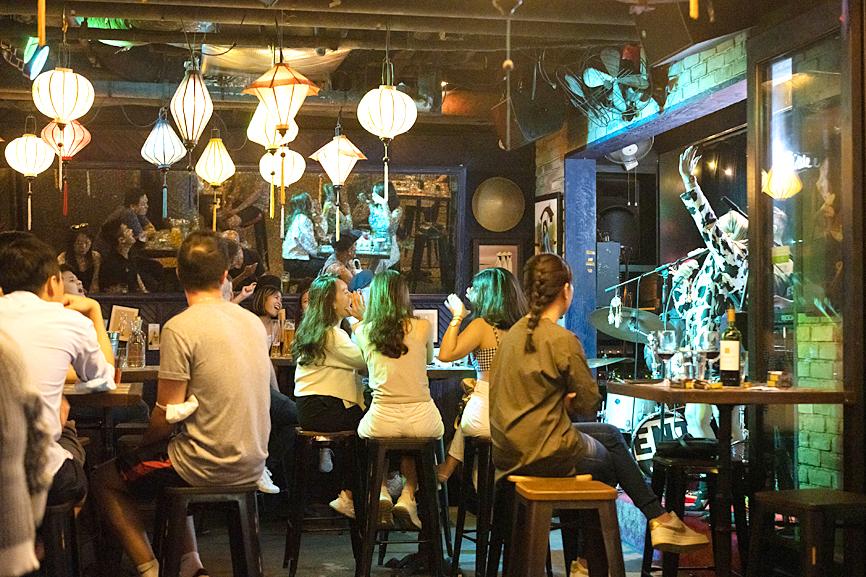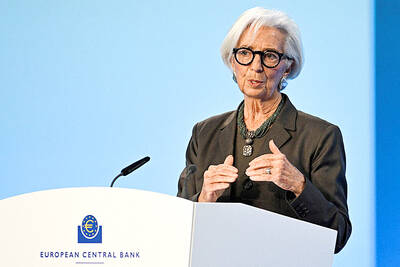Core inflation in Singapore accelerated faster than expected to the highest in a decade, in sync with the central bank’s projections that price growth might worsen before it gets better on geopolitical shocks and supply-chain backlogs.
The core consumer price index (CPI) tracked by the Monetary Authority of Singapore (MAS) — which excludes private transport and accommodation costs — rose 2.9 percent last month, on the back of costlier food and services. That is the fastest since March 2012 and is showing a quickening for the past eight of nine months.
That compares with the median forecast in a Bloomberg survey for a 2.5 percent increase, and the 2.2 percent pace in February.

Photo: Bloomberg
“External inflationary pressures have intensified amid sharp increases in global commodity prices and renewed supply chain disruptions driven by both the Russia-Ukraine conflict and the regional pandemic situation,” the MAS and the Singaporean Ministry of Trade and Industry said in a joint statement yesterday. “MAS core inflation is forecast to pick up further in the coming months, before moderating towards the end of the year as some of the external inflationary pressures recede.”
Singapore’s headline inflation last month rose by 5.4 percent from a year earlier, compared with estimates for a 4.7 percent increase and February’s 4.3 percent.
Among drivers of the all-items index were transportation costs, which picked up at the fastest pace since 1980.
The MAS and ministry reiterated estimates that core inflation should be between 2.5 and 3.5 percent this year, while headline inflation runs within 4.5 and 5.5 percent.
The figures followed the central bank’s decision earlier this month to tighten monetary policy for a third time since October last year, as it warned inflation pressures remain a risk in the medium term.
Singaporean officials have recently been warning that the inflation could be longer-lasting as part of a new economic reality, beyond immediate supply and demand shocks.
Tharman Shanmugaratnam, MAS chairman and a senior minister, said at a Boao Forum for Asia event on Friday that “we are dealing with a fundamentally new macroeconomic environment globally.”
The new environment requires big spending on new supply capacity, mobilizing and “de-risking” private capital to invest in emerging economies, and raising taxes in both advanced and emerging economies, Tharman said.
Separately, the Bank of Korea should stay on a path to policy normalization as inflation remains a more pressing concern than a slowdown in economic growth, Governor Rhee Chang-yong said.
“I’m more worried about inflation so far,” the newly installed governor said yesterday in his first meeting with media since taking office last week. “I’ll still need to look at the data to tell what the pace of interest-rate hikes should be.”
Rhee said last week in his parliamentary hearing that he favors higher interest rates unless there is a threat to the economic outlook.

European Central Bank (ECB) President Christine Lagarde is expected to step down from her role before her eight-year term ends in October next year, the Financial Times reported. Lagarde wants to leave before the French presidential election in April next year, which would allow French President Emmanuel Macron and German Chancellor Friedrich Merz to find her replacement together, the report said, citing an unidentified person familiar with her thoughts on the matter. It is not clear yet when she might exit, the report said. “President Lagarde is totally focused on her mission and has not taken any decision regarding the end of

French President Emmanuel Macron told a global artificial intelligence (AI) summit in India yesterday he was determined to ensure safe oversight of the fast-evolving technology. The EU has led the way for global regulation with its Artificial Intelligence Act, which was adopted in 2024 and is coming into force in phases. “We are determined to continue to shape the rules of the game... with our allies such as India,” Macron said in New Delhi. “Europe is not blindly focused on regulation — Europe is a space for innovation and investment, but it is a safe space.” The AI Impact Summit is the fourth

CONFUSION: Taiwan, Japan and other big exporters are cautiously monitoring the situation, while analysts said more Trump responses ate likely after his loss in court US trading partners in Asia started weighing fresh uncertainties yesterday after President Donald Trump vowed to impose a new tariff on imports, hours after the Supreme Court struck down many of the sweeping levies he used to launch a global trade war. The court’s ruling invalidated a number of tariffs that the Trump administration had imposed on Asian export powerhouses from China and South Korea to Japan and Taiwan, the world’s largest chip maker and a key player in tech supply chains. Within hours, Trump said he would impose a new 10 percent duty on US imports from all countries starting on

STRATEGIC ALLIANCE: The initiative is aimed at protecting semiconductor supply chain resilience to reduce dependence on China-dominated manufacturing hubs India yesterday joined a US-led initiative to strengthen technology cooperation among strategic allies in a move that underscores the nations’ warming ties after a brief strain over New Delhi’s unabated purchase of discounted Russian oil. The decision aligns India closely with Washington’s efforts to build secure supply chains for semiconductors, advanced manufacturing and critical technologies at a time when geopolitical competition with China is intensifying. It also signals a reset in relations following friction over energy trade and tariffs. Nations that have joined the Pax Silica framework include Japan, South Korea, the UK and Israel. “Pax Silica will be a group of nations